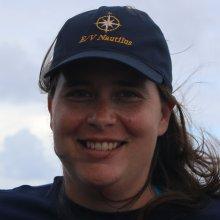
Elizabeth Trembath Reichert
Tell us about your work/research. What kinds of things do you do?
I study the microorganisms that live in environments where sunlight (or products of sunlight) cannot be used for energy. I am specifically interested in how they make a living and how fast they do it. This generally involves: 1) collecting microbes at sea, preserving them, and taking them back to my home laboratory for analysis to understand what the microbial community looks like at the moment we sampled, and 2) preparing a range of bottles containing potential food sources I am interested in testing that is tagged with a tracer and then incubating seawater, rocks, or sediment with the food to see if microbes can use it and how fast they used it (amount per time). These types of analyses are used to better understand the breadth of life on our planet and the potential for life on other planets that may have different surface conditions than Earth.
What sparked your initial interest in your career?
In college, I made a semester by semester transition from an international politics to environmental policy to environmental science. Through different summer research opportunities, I found I enjoyed working in the lab (I should be a scientist!) and in the field (I should be an environmental scientist!) more than writing essays and reading books.
Who influenced you or encouraged you the most?
I would say the Earth encouraged me the most. There are so many mysteries left to discover and every answer only begets more questions.
What element of your work/study do you think is the most fascinating?
I enjoy being at the frontier of the unknown, where we are questioning if there is life, much less how it makes a living. This often involves working in extremely challenging environments where the microbes are very deep in the Earth, very low in number, and very slow in activity.
What other jobs led you to your current career?
Through summer research experiences in college, I knew I wanted to be a research scientist, but environmental microbiology can fit in many different departments. While maintaining a similar research program from undergrad to postdoc, I have been in environmental science, geology, and chemistry departments. I decided to take some time off between undergrad and graduate school to explore different research options and took a government position with NOAA. There I first went to sea and decided I wanted to do research that involved an oceanographic field program.
What are your degrees and certifications?
BA in Environmental Science and Physics - Barnard College, 2008; Ph.D. in Geobiology - California Institute of Technology (2016)
What are your hobbies?
I enjoy being outside whenever I can and exploring new ways of collecting, preparing and eating food.
What advice would you give someone who wants to have a career like yours?
I have met so many people with different career paths to environmental microbiology. I never even took a microbiology course until I got to graduate school! I believe the key is to have a foundation in logic and problem solving, which can come from anywhere (English major to engineering) and take you anywhere.
Expeditions
Elizabeth participated in the following Ocean Exploration Trust expeditions:
